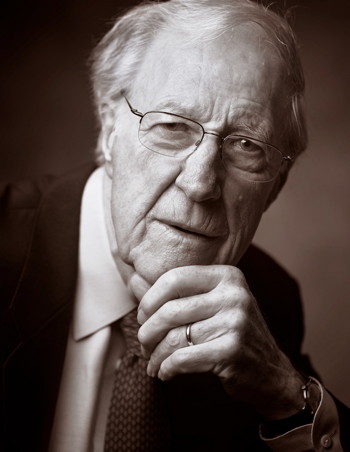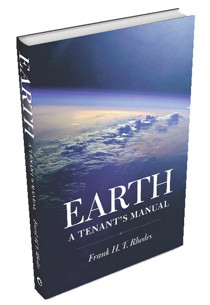BOOKS
A geologist's view on humanity

Cornell President Emeritus Frank H.T. Rhodes See larger image
Cornell President Emeritus Frank H.T. Rhodes has just published "Earth: A Tenant's Manual" (Cornell University Press), a 384-page exploration of planet Earth, from its place in the universe to the evolution of life on its land and in its seas. Looking at Earth's past, present and future, Rhodes asks whether humanity's continued existence on this planet is sustainable – and what changes will need to be made if we want to extend our lease on Earth. "We're tenants here, not owners," Rhodes states in this frank book that reflects the scientist's sober gaze and his own innate optimism. Rhodes chatted recently about the book with Joe Wilensky, managing editor of Ezra.
Listen to audio highlights of the interview on the multimedia page.
How long has "Earth: A Tenant's Manual" been in the making?
It's three or four years now. It really has gone very slowly because I needed to learn a lot in order to put it together. Many of my Cornell colleagues have been really wonderful, because the span of interests is such that there is every possibility of making huge mistakes on every page. So I've just had tremendous help from friends on campus – reading my drafts, pointing out the errors and helping me get it more or less right.
What was your inspiration for this book?
A long time ago, I wrote a little book called "The Evolution of Life." It's very comprehensive; it deals with the development from single cells to complex animals, including ourselves. And the clear implication of that is that nothing lasts forever. There's an origin, there's a flourishing, and then there's an extinction. And extinction takes many forms and follows for many reasons. But every species is totally dependent on the environment and the resources of the planet. We live off the planet – that's the way life works. And that really got me thinking about the whole question of resources. We support ourselves by scrounging the Earth for metals, energy, soil, water – and every one of those now is in serious short supply. … Add to that the fact that we have just exploded in numbers, the human population. We face serious long-term issues. … So that burgeoning population, limited resources and extinction being a fact of life came together and made me think this was worth trying to tackle.

Book cover image: "Earth: A Tenant's Manual" See larger image
What role can American research universities, and Cornell in particular, play in your prescription for solutions?
The only thing that will preserve us as a species is smart solutions, new knowledge – and the will to apply it. Cornell is uniquely placed to take the lead in this, if it so chooses. … You think about the colleges we have – medicine, veterinary medicine, engineering, human ecology, agriculture and life sciences, arts and sciences, architecture – all these have extraordinarily close links with the problems we're facing in designing smart buildings, in coping with the world's growing problems with hunger, with epidemics where people still die of malaria and malnutrition. Cornell, if it chose, could be front and center in addressing these issues. Partly in research, partly in the land-grant role of actually doing and not just talking about it. … and partly in educating students to think in these terms. I think education is really key to getting a sustainable future. And that's partly research; it's partly teaching. It's teaching that goes back to grade-school level.
In compiling and researching all the data for this book, was there any discovery or conclusion that particularly surprised you?
Two things: One is the convergence of so many of these trends. When you add them together, they become cumulative and reinforcing, unfortunately. And the other is the urgency. It's one thing to talk about 9 billion people, but when you think of the strain that imposes on everything else, and that most of the population growth is going to be in Asia and much of it in sub-Saharan Africa, that poses incredible problems; and it's not just technical solutions, it's the political will to implement them. That's enormously difficult given the number of people we're talking about and the degree of poverty in many of those countries.
What reception would you like to see this book get?
I hope it will create discussion; I can see it producing both disagreement and nodding agreement. But I hope it will provoke debate. The fundamental questions are: Is this alarmist, or does it understate the situation, or is it a levelheaded assessment of where we stand as a global population? And if it is, do we have the capacity to do something about it? And that's much harder.
Do the book's ultimate conclusions reflect your own optimism?
Yes – I really do believe in the capacity of humans to adapt. We're an incredibly creative species; that's how we've managed to inflict so much damage on every other species. But turn that in the right direction, turn that creatively, and we have almost undreamed of capacity to pull back and to do good in a positive sense. … It's human nature, really, that's the biggest obstacle. It was [British mathematician and philosopher] Alfred North Whitehead who said that there's this big difference between knowledge and wisdom. Wisdom is the way in which knowledge is held and used, and not just knowledge of the head but knowledge of the heart, and how you apply that to human good. And we're willfully blind much of the time [to] having this sense of responsibility. But again, I remain an optimist in this, because knowledge just is auto-catalytic. It expands, and we're smart enough to see the gross human benefit in trying to get this right. We've got to be.